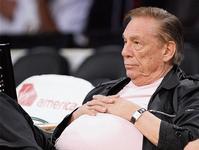

Los Angeles Clippers team owner Donald Sterling. - FILE

NBA Commissioner Adam Silver
A cadre of attorneys and a flurry of lawsuits could certainly slow down the NBA's plan to force Donald Sterling to sell the Los Angeles Clippers over his recent racist comments, but legal experts say the league would likely prevail in the end.
And that goes for Sterling's wife, Shelly, who has said she'd like to keep her stake in the team even if her husband is ousted.
The NBA's constitution, which Donald Sterling signed as controlling owner of the Clippers, gives its Board of Governors broad latitude in league decisions, including who owns the teams, NBA Commissioner, Adam Silver, is pushing for a swift vote against Sterling, which requires a minimum of three-fourths of the other 29 controlling owners to agree.
Silver also has imposed a lifetime ban on Sterling and a $2.5 million fine. The ban does not apply to Shelly Sterling.
"Sterling's own signature will come back to haunt him," said Michael McCann, founding director of the Sports and Entertainment Law Institute at the University of New Hampshire.
"You agree to certain basic understandings. That's what makes a sports league different from other businesses."
The key to the NBA's authority, attorneys say, is Article 13(d) of the league's constitution. That section says that, whether Sterling intended to or not, an owner cannot "fail or refuse to fulfill" contractual obligations to the NBA "in such a way to affect the association or its members adversely."
There's plenty of evidence Sterling's comments, revealed in a recorded conversation with a female companion, affected the league adversely. They provoked threats of a player boycott, led sponsors to withdraw support and created a racially charged image problem in the midst of the NBA play-offs that even President Barack Obama remarked upon.
If Article 13(d) was violated, the legal experts say the Board of Governors has solid grounds to force Sterling to sell the team along with any other owners, in this case his wife.
As long as the NBA meticulously follows its own constitution and rules regarding the Clippers sale, it will be difficult for Sterling to find a legal theory that would stand up in court, said Daniel Lazaroff, director of the Sports Law Institute at Loyola Law School in Los Angeles.
"This is not an antitrust issue. This is not a First Amendment issue," Lazaroff said. "It's a question limited to the interpretation of the NBA constitution and bylaws, and whether those terms are met."
